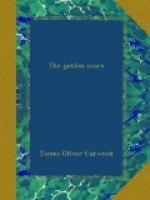The futility of speech kept his own lips closed. At last Bram looked at him, and pointed to his snowshoes where he had placed them last night against the snow dune. His invitation for Philip to prepare himself for travel was accompanied by nothing more than a grunt.
The wolves were returning, sneaking in watchfully and alert. Bram greeted them with the snap of his whip, and when Philip was ready motioned him to lead the way into the north. Half a dozen paces behind Philip followed Bram, and twice that distance behind the outlaw came the pack. Now that his senses were readjusting themselves and his pulse beating more evenly Philip began to take stock of the situation. It was, first of all, quite evident that Bram had not accepted him as a traveling companion, but as a prisoner; and he was equally convinced that the golden snare had at the last moment served in some mysterious way to save his life.
It was not long before he saw how Bram had out-generaled him. Two miles beyond the big drift they came upon the outlaw’s huge sledge, from which Bram and his wolves had made a wide circle in order to stalk him from behind. The fact puzzled him. Evidently Bram had expected his unknown enemy to pursue him, and had employed his strategy accordingly. Why, then, had he not attacked him the night of the caribou kill?
He watched Bram as he got the pack into harness. The wolves obeyed him like dogs. He could perceive among them a strange comradeship, even an affection, for the man-monster who was their master. Bram spoke to them entirely in Eskimo—and the sound of it was like the rapid clack—clack—clack of dry bones striking together. It was weirdly different from the thick and guttural tones Bram used in speaking Chippewyan and the half-breed patois.
Again Philip made an effort to induce Bram to break his oppressive silence. With a suggestive gesture and a hunch of his shoulders he nodded toward the pack, just as they were about to start.
“If you thought I tried to kill you night before last why didn’t you set your wolves after me, Bram—as you did those other two over on the Barren north of Kasba Lake? Why did you wait until this morning? And where—where in God’s name are we going?”
Bram stretched out an arm.
“There!”
It was the one question he answered, and he pointed straight as the needle of a compass into the north. And then, as if his crude sense of humor had been touched by the other thing Philip had asked, he burst into a laugh. It made one shudder to see laughter in a face like Bram’s. It transformed his countenance from mere ugliness into one of the leering gargoyles carven under the cornices of ancient buildings. It was this laugh, heard almost at Bram’s elbow, that made Philip suddenly grip hard at a new understanding—the laugh and the look in Bram’s eyes. It set him throbbing, and filled him all at once with the desire to seize his companion by his great shoulders and shake speech from his thick lips. In that moment, even before the laughter had gone from Bram’s face, he thought again of Pelletier. Pelletier must have been like this—in those terrible days when he scribbled the random thoughts of a half-mad man on his cabin door.




